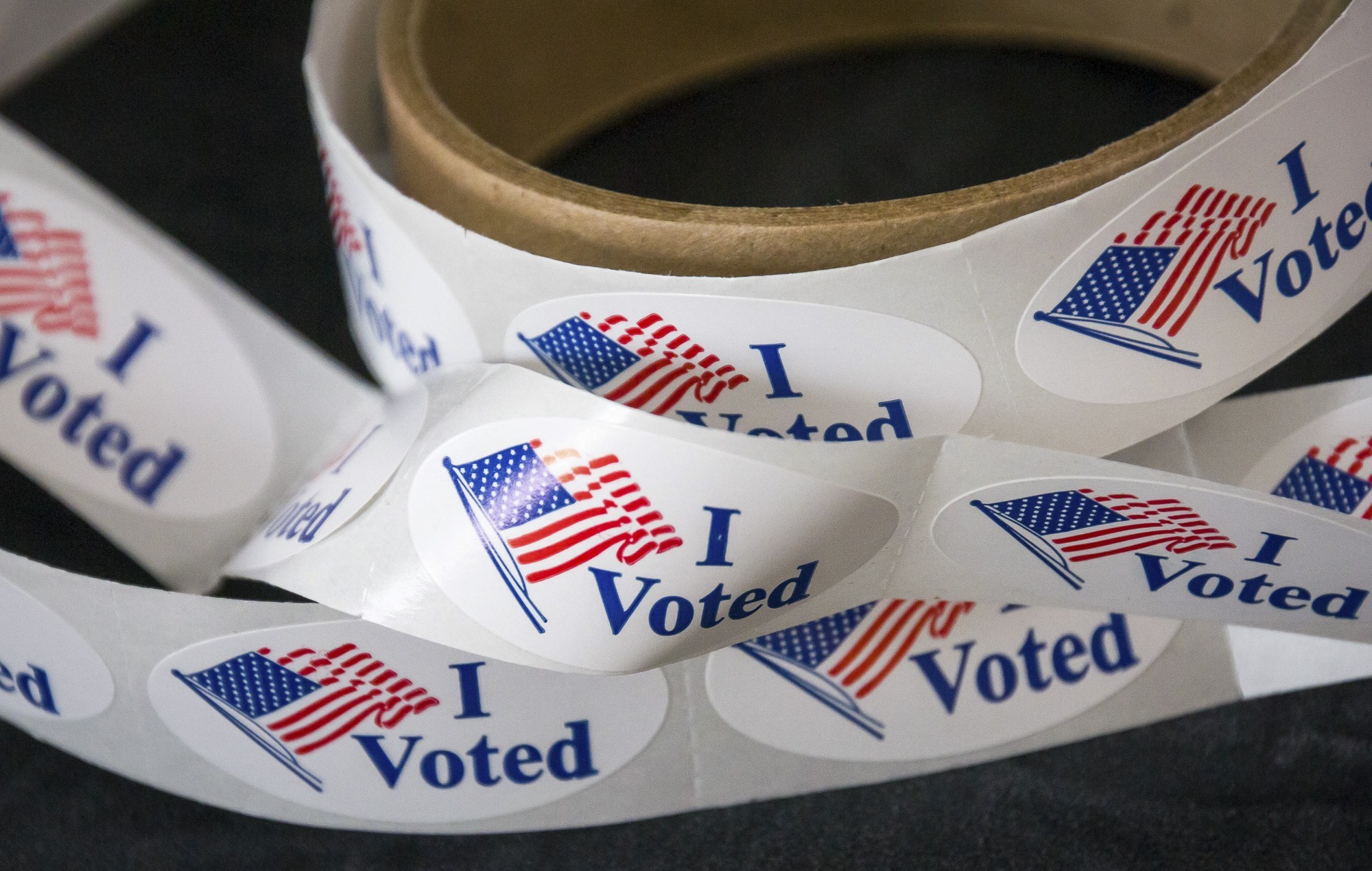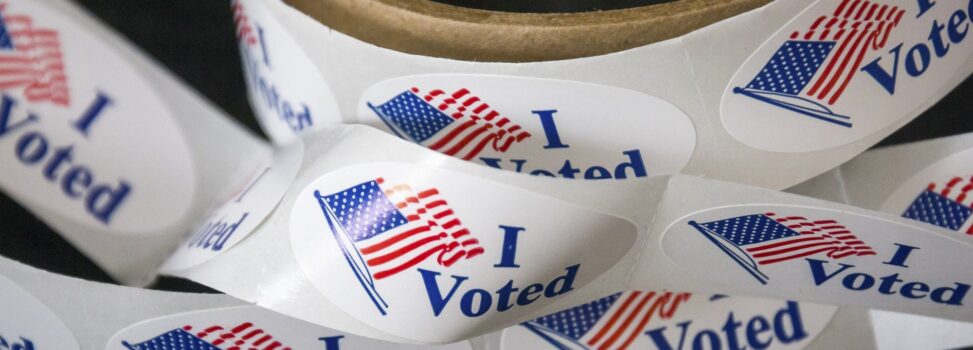AI Risks to Election Security: What you need to know before you vote!
Tuesday, September 24, 2024
NSF Hybrid Event
In-Person at
Tamarack Casino
13101 S. Virginia St, Reno, NV
(Park and enter using Banquet Hall door on the north side of the building)
Breakfast served 8:00-9:00am, Forum 9:00-10:15am
Virtual on Zoom
Forum 9:00-10:15am PST
Register in advance for this webinar:
https://us06web.zoom.us/webinar/register/WN_mgrvplF7TXG-8AlQACrmpg
After registering, you will receive a confirmation email containing information about joining the webinar.
KEYNOTE SPEAKERS:
Rex and Caleb Briggs
Reno technology experts and authors of “The AI Conundrum”
INVITED DISCUSSANTS:
Michael Matthews
DHS/CISA, Protective Security Advisor for Nevada, DHS/CISA
Casey Keckler
DHS/IA, Intelligence Officer, Northern Nevada
NSF remains committed to keeping you informed about issues beyond the headlines and from multiple perspectives. Stay up to date on NSF programs by subscribing to our mailing list at: NSF Mailing List or better yet become a member at: Become a Member.
For most of our upcoming programs we will be meeting at Tamarack Casino in South Reno. When you turn into the parking lot turn right and follow the signs for the “Banquet Room.” Park anywhere on the northside of the building and enter via the walkway into the reception hall for the banquet room. We will see you there!!! You can always email Kimberly at: info@nationalsecurityforum.org or me at: mccarthy@nationalsecurityforum.org if you have questions or need more information about the location.
And now for the details about our upcoming breakfast forum on Tuesday August 20th…
“This year is the first national American election since AI developments will allow fraudsters to produce phony but close-to-perfect pictures, video, or audio of candidates and officials doing or saying almost anything with minimal time, little to no cost, and on a widespread basis. And the technology underlying generative AI chatbots lets hoaxers spoof election websites or spawn pretend news sites in a matter of seconds and on a mammoth scale. It also gives bad actors— foreign and domestic—the ability to conduct supercharged, hard-to-track interactive influence campaigns.” (The Election Year Risks of AI, Brenan Center for Justice, 09May2024, https://www.brennancenter.org/our-work/analysis-opinion/election-year-risks-ai)
As the United States heads into a contentious election season, the “facts” about the candidates may be even more elusive than we imagined. Artificial Intelligence (AI) is reshaping how, when, where, and even what information voters are seeing about candidates and issues.
“In January of 2024, a robocall went around New Hampshire purporting to be President Joe Biden. “Your vote makes a difference in November, not this Tuesday,” the voice said, attempting to dissuade early voters from turning out at the polls. Authorities deduced that this fraudulent message was produced by artificial intelligence (‘AI’).” (AI Threats in Elections: What Nonprofits Must Know, Alliance for Justice, 16Jul2024, https://afj.org/article/ai-threats-in-elections-what-nonprofits-must-know/)
The United States has a long history of propaganda and outright lies circulating during elections seasons. AI can muddy these already murky waters through the generation of deepfake content with candidates appearing to say and do things that aren’t real. On the flipside, AI is also a powerful tool in detecting deepfakes and alerting content providers and election authorities about their existence. Amidst the dire predictions about the potential impacts of AI on the upcoming US general election, there is some glimmer of hope from watchers of elections in other countries.
“With a substantial number of this year’s elections concluded, it is a good time to ask how accurate these assessments have been so far. The preliminary answer seems to be not very; early alarmist claims about AI and elections appear to have been blown out of proportion.” (AI’s Impact on elections is being overblown, MIT Technology Review, 03Sep2024, https://www.technologyreview.com/2024/09/03/1103464/ai-impact-elections-overblown/)
NSF is honored to have two local technology leaders and AI experts guide us through the facts, fate, and future of AI risks to US elections. Rex and Caleb will review the ins and outs of AI content generation including deepfakes, how AI is being used to detect fake content, and the conundrum of the “liar’s dividend.” The liar’s dividend, a phrase coined by Brennan Center for Justice, happens when election disrupters claim legitimate campaign video and voice content are fake.
For more background on the liar’s dividend, see Deepfakes, Elections, and Shrinking the Liar’s Dividend, Brennan Center for Justice, 23Jan2024, https://www.brennancenter.org/our-work/research-reports/deepfakes-elections-and-shrinking-liars-dividend)
Rex and Caleb will also shine a bright light on how AI algorithms segment us and aim to influence our attitudes and behaviors, and most important, what we can do to be more aware and resistant to malicious AI influences. They will be joined by two Nevada-based experts from the Department of Homeland Security (DHS), who will discuss proactive actions that DHS and other agencies are taking to detect and mitigate the consequences of malicious AI in our elections. Attendees at earlier NSF events will recognize Michael Matthews the Protective Security Advisor for Nevada from DHS Cybers and Infrastructure Security Agency (CISA) and Casey Keckler, the Intelligence Officer for Northern Nevada from DHS Office of Intelligence & Analysis (IA).
Together our panelists will guide us through a rapidly changing threat environment and efforts that federal, state, and local election officials are taking to counter the risk of AI to US elections.
As a bonus to NSF members who attend this forum in-person, Rex has generously donated copies of their new book, “The AI Conundrum” for you to take home. If you are not a current NSF member, I suggest you join or renew now so you can get a copy at our upcoming forum. If you are a stalwart NSF member who attends our events virtually, please send me your mailing address and I will arrange to have your copy delivered via snail mail.
Please join us for a very important and timely program and be ready to share your thoughts and questions with our speakers.
Rex Briggs is an award-winning marketing researcher and data scientist. Rex has been working with machine learning and neural networks for over 30 years. Rex was the first director of research for WIRED, and a pioneer in digital measurement and AI with five patents. The Market Research Council named Rex as the 2022 Change Maker for his work with the Ad Council on applying AI. He is co-author of What Sticks (2006), a book that has been required reading at Wharton, Harvard, and other leading universities. He is also author of SIRFs Up, How Software and Algorithms Are Changing Marketing (2012). Rex is a board member at Cal Poly, SLO, College of Business Analytics’ program, and a business founder that made it to the top of Inc. 500 fastest growing companies multiple times. He successfully exited his AI business, Marketing Evolution, in 2019. He now enjoys mentoring growth stage companies on how to scale their business and training corporations to build an AI-first with responsibility.
Caleb Briggs began coding when he was 10. By 14, he was instructing dozens of adult teachers to code in MIT’s Scratch program, so they could carry what they learned from him into their classrooms in the wider community. In high school, his math skills were beyond the curricula, so he attended Harvey Mudd College and later, Stanford University to advance his skills. At the same time, Caleb attended Sage Ridge, a small private high school in Reno-Tahoe area of Nevada, where he wrote a variety of AI programs using genetic algorithms, computer vision and natural language models. It was through this work, going deep into the mathematics of AI, that he recognized the weaknesses of AI. His senior thesis was entitled the Fundamental Limitations of AI, which MIT commissioned for publication. Caleb now attends Reed College, where he studies pure math and computer science.
Casey Keckler currently serves as an Intelligence Officer within the Field Operations Division (FOD) of the U.S. Department of Homeland Security (DHS) Office of Intelligence and Analysis (I&A) based in Northern Nevada. Casey began his career in the Intelligence Community as a Counterterrorism Analyst in 2007. Over the course of his analytic career, Casey has represented the Department in Europe and the Middle East; served as an executive briefer for DHS leadership; and was selected to serve on an Executive Office Task Force for Guantanamo Bay Detainees. Prior to the start of his IC career, Casey was a Legislative Aide for a U.S. Senator who assigned him to his committee staff on the Senate Judiciary Committee. Earlier in his career, Casey served as a Public Affairs Officer at the U.S. Department of Treasury and Law Enforcement Officer in northwest Ohio. Casey earned a B.S. in Political Science from Heidelberg University in Tiffin, Ohio and a Master of Public Administration and International Affairs from Bowling Green State University. In 2009, Casey was awarded the Pat Roberts Intelligence Scholarship and was the first I&A Intelligence Analyst chosen to attend the Defense Intelligence Agency’s National Intelligence University on a full-time basis where he earned a Master of Science in Strategic Intelligence.
Mike Matthews is a Protective Security Advisor (PSA) with the U.S. Department of Homeland Security’s (DHS) Cybersecurity and Infrastructure Security Agency (CISA). PSAs are senior DHS officials who are critical infrastructure protection and vulnerability/risk mitigation subject matter experts. They facilitate local field activities in coordination with other Department of Homeland Security offices as well as advise senior level state, local, and private sector officials and critical infrastructure facility owners and operators. Prior to DHS, Mike was a Regional Director of Emergency Management with the US Department of Transportation, a former FEMA Operations Planner, Department of Defense (DoD) Contractor (both overseas and in the U.S.), Deputy Sheriff, and a U.S. Navy Veteran. Michael holds a bachelor’s degree in Organizational Leadership from Chapman University and a master’s degree in Security Studies from the Naval Postgraduate School’s Center for Homeland Defense and Security (CHDS). He also completed CHDS’ Pacific Executive Leadership Program. He is a registered Subject Matter Expert and research reference for the DoD Homeland Defense Information Analysis Center. Michael has been personally recognized by FEMA Administrator, Craig Fugate, the Secretary of Transportation, Elaine Chao, and the San Francisco Federal Executive Board. He is a published author in the Intelligence and National Security Journal.
The National Security Forum is a non-partisan, educational, nonprofit organization dedicated to fostering civil discourse and informed discussion about timely and important national security topics. We bring expert speakers from around the U.S. to talk about national and international security, domestic and foreign terrorism, economic and financial threats, the safety of our food and water supply, energy policy, electrical grid stability, and a variety of other topics that affect all Americans. The National Security Forum partners with the Washoe County School District to host an annual Youth Security Forum to encourage future generations national security leaders.
To support NSF continuing to bring national security programs to our community and our local students please join NSF as a member or Friend of the Forum at: https://nationalsecurityforum.org/membership/about-our-membership/


